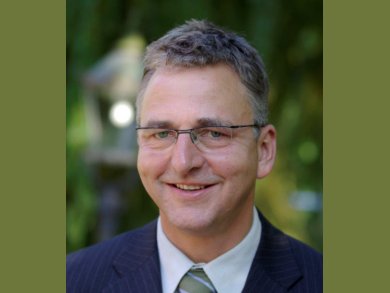Uwe Bornscheuer is Professor of Biotechnology and Enzyme Catalysis at the University of Greifswald, Germany. In his research, he uses enzymes for applications in organic synthesis by using rational tools for protein engineering and directed evolution. He also is Editor-in-Chief of the European Journal of Lipid Science and Technology.
Here, he talks to Lisa-Marie Rauschendorfer for the ChemViews Magazine about his exciting field of research, broad experience in publishing, and sailing.
Could you please tell us something about your research?
We work on biocatalysis and, more specifically, we use enzymes for applications in organic synthesis – especially to make optically pure compounds. These can then serve as building blocks to make pharmaceuticals. We also use enzymes for lipid modification in order to make more healthy lipids for human nutrition, for example.
The most important methodology we have been working on for about ten years is the so-called protein engineering. With this method we try to improve the properties of an enzyme in terms of selectivity, stability, etc. to adapt it for a given process.
How did you develop your interest in biocatalysis and enzyme technology?
I studied chemistry at the University of Hannover, Germany, and at the end of my studies I had to decide whether I would like to go to the organic chemistry department or to the department of chemical engineering. In my last practical course I joined a group at the chemical engineering department that was doing fermentation and, to a small extent, also biocatalysis. I then used enzymes to do a kinetic resolution in order to gain an optically pure organic compound. So it was the perfect match for me, because I could keep my interest in organic synthesis and at the same time I could work with enzymes. That was my starting point for biocatalysis and since then I have been working in this area.
What do you find so fascinating about biocatalysis?
First of all, it is the fact that one can study similar reactions like chemists do, but with the possibility to perform this under milder reaction conditions and usually with much higher selectivity. Thereby, one hopefully can save organic solvents, toxic chemicals, and energy. So the overall processes can be greener compared to the original chemical approach.
At the same time, I really got interested in biochemistry and molecular biology, because I find it quite fascinating that proteins are able to catalyze so many types of reactions very efficiently and that you can work in a highly interdisciplinary area.
What do you think is the most important development in biocatalysis right now?
In the general field of biocatalysis or enzymology, I think the most important development is that we now have the molecular biology tools available to design the proteins in a distinct way, in a reasonable period of time, and with quite good success compared to ten years ago. In my opinion, it is also very important that now we are able to combine protein engineering methods with the information from the sequencing of genomes and metagenomes. It can also be expected that in the near future we will be able to construct microorganisms that not only produce typical metabolites, but can also produce compounds of interest for organic synthesis.
What do you think are the most important future applications?
I think we already see the tendency that very efficient alternative methods have been developed using the tools of biotechnology – not only biocatalysis. These include the whole cell bio-transformations where some basic chemicals already have been replaced. The most prominent examples are acrylamide produced from acrylonitrile by a single enzyme and 1,3-propandiol obtained from glycerol or glucose as carbon source with metabolically engineered microorganisms. In both cases the products are important monomers for the polymer industry and are produced on the scale of several 100,000 tons per year.
A very recent breakthrough was the biotechnological synthesis of artemisinic acid, the precursor of the most prominent anti-malaria drug, artemisinin. Here also metabolic engineering and synthetic biology were the key tools to make the biological synthesis in the microbial host efficient.
You are co-author of the 2nd edition of “Biocatalysis and Enzyme Technology”. Why is writing a book important to you?
Of course, there is a well-known quotation “publish or perish”, but this rather applies to original research papers.
First of all, before I studied I worked at a newspaper and I was very close to become a journalist, so this maybe explains why I really like to write.
The second reason, which is more important, of course, is that I am a teacher at the university. I think it is my task to disseminate my knowledge, which I gained over the years, in a format suitable for the students to learn what is going on in a certain field. Hence, the book “Biocatalysis and Enzyme Technology” is directed to teach students taking advanced courses in biocatalysis.
At the same time, I also published another book with Romas Kazlauskas: “Hydrolases in Organic Synthesis”. The audience here are advanced researchers, postdoctoral researchers, and established scientists. Also here I find it is really important to write a book by yourself as you can shape it in the way you would like to see it in terms of the chapters, the organization, and the content.
You also are Editor-in-Chief of the European Journal of Lipid Science and Technology
. What is your motivation for this?
I have been editor of the European Journal of Lipid Science and Technology or EJLST for five years. For the editor job my motivation is different than for writing. First of all, a scientist should take responsibility in reviewing papers of other scientists because their own publications need to be reviewed as well. In my group we are always happy when we submit our papers to a journal where we know that the editor is competent and handles a paper in a reasonable period of time. So I think a scientist should help the scientific community and the publishers in organizing high-quality journals.
I very much enjoy being an editor as I learn a lot too. EJLST covers many disciplines in the lipid area such as biosciences, nutrition, health, analytical methods, plant oil production, etc. So I find this job really fascinating and I enjoy working with a dedicated team at Wiley as well as with the professional members of the editorial board.
The Journal focuses on lipid sciences. Why is this topic of special interest for you?
I came across this topic during my postdoctoral research in Japan, where I started to use lipases for lipid modification. At this time we worked on the synthesis of monoglycerides using these enzymes. When I went back to Germany, to Stuttgart for my habilitation, we worked on a project where we were interested in making a special lipid enzymatically, which resembles the most important lipid in mother’s milk. Usually, if a mother cannot breast-feed her child, she uses milk powders derived from cow’s milk. It has a different fatty acid composition. We were able to successfully develop an enzymatic synthesis to make the most important lipid in mother’s milk in high purity and yield.
Still, lipid science is fascinating, because you can do a lot to improve human nutrition by applying biocatalysis for the modification of lipids. For example, we recently developed a lipase by protein engineering, which can hydrolyze selectively trans-fatty acids from plant oils.
How do you manage to do all this as well as your research?
Actually, I do not know how. I have a quite large research group with about 40 people. I have to do teaching, which I enjoy very much, review many papers, I also have to write grant applications, and, of course, my own publications. So I am really surprised at the end of the year, when we have our group Christmas Party, that – despite all the stress and all the chaos over the year – we eventually managed many things successfully.
So what do you do in your rare spare time?
During summer I like to go sailing – Greifswald is on the coast of the Baltic Sea. Last year I bought a small boat together with a friend. So we enjoy sailing and, of course, this helps a lot to get your head free, get rid of all the stress, and relax. At the same time it can be challenging if the wind is a bit stronger than expected.
My second hobby is to ride a motorbike, which I have been doing since I was sixteen years old. So I also enjoy that. I either do small excursions in the unfortunately rather flat region around Greifswald or, once a year, I do a bigger tour with some friends.
Thank you very much for this interview.
 Uwe Bornscheuer was born in 1964. After studying Chemistry he obtained his Ph.D. in 1993 at the University of Hanover, Germany. For his postdoctoral research with a focus on lipase-catalyzed synthesis, he joined the research group of Professor T. Yamane, University of Nagoya, Japan. Returning to Germany, he gained his Habilitation in technical biochemistry in Stuttgart and moved to Greifswald in 1999 for a full professorship.
Uwe Bornscheuer was born in 1964. After studying Chemistry he obtained his Ph.D. in 1993 at the University of Hanover, Germany. For his postdoctoral research with a focus on lipase-catalyzed synthesis, he joined the research group of Professor T. Yamane, University of Nagoya, Japan. Returning to Germany, he gained his Habilitation in technical biochemistry in Stuttgart and moved to Greifswald in 1999 for a full professorship.
His research focuses on the design and application of enzymes for stereoselective organic synthesis and for lipid modification by using rational tools and directed evolution.
He is author of more than 300 publications in peer-reviewed journals and has more than 30 patent applications. He is also Editor-in-Chief of the European Journal of Lipid Science and Technology and Co-Chairman of the Editorial Board of ChemCatChem.
Selected Awards
- Chevreul Medal, SFEL, France (2012)
- Biocat Award (2008)
- Fellowships from the Japanese Society for the Promotion of Science (1993, 2010)
Selected Publications
- Engineering the third wave in biocatalysis,
U. T. Bornscheuer, G. Huisman, R. J. Kazlauskas, S. Lutz, J. Moore, K. Robins,
Nature 2012, 485 (7394), 185–194.
DOI: 10.1038/nature11117 - Rational assignment of key motifs for function guides in silico enzyme identification,
M. Höhne, S. Schätzle, H. Jochens, K. Robins, U. T. Bornscheuer,
Nature Chem. Biol. 2010, 6 (11), 807–813.
DOI: 10.1038/nchembio.447 - Exploiting the regioselectivity of Baeyer-Villiger-monooxygenases for the formation of -amino acids and -amino alcohols,
J. Rehdorf, M. D. Mihovilovic, U. T. Bornscheuer,
Angew. Chem. Int. Ed. 2010, 49 (26), 4506–4508.
DOI: 10.1002/anie.201000511 - Finding better protein engineering strategies,
R. J. Kazlauskas, U. T. Bornscheuer,
Nature Chem. Biol. 2009, 5 (8), 526–529.
DOI: 10.1038/nchembio0809-526 - Converting an esterase into an epoxide hydrolase,
H. Jochens, K. Stiba, C. Savile, R. Fujii, J.-G. Yu., T. Gerassenkov, R. J. Kazlauskas, U. T. Bornscheuer,
Angew. Chem. Int. Ed. 2009, 48 (19), 3584–3587.
DOI: 10.1002/anie.200806276
- Complete inversion of enantioselectivity towards acetylated tertiary alcohols by a double mutant of a Bacillus subtilis esterase,
S. Bartsch, R. Kourist, U. T. Bornscheuer,
Angew. Chem. Int. Ed. 2008, 47 (8), 1508–1511.
DOI: 10.1002/anie.200704606
 Biocatalysts and Enzyme Technology (2nd Edition),
Biocatalysts and Enzyme Technology (2nd Edition),
K. Buchholz, V. Kasche, U. T. Bornscheuer,
Wiley-VCH, Weinheim, Germany, 2012.
ISBN: 978-3-527-32989-2

Hydrolases in Organic Synthesis,
U. T. Bornscheuer, R. J. Kazlauskas,
Wiley-VCH, Weinheim, Germany, 2006.
ISBN: 978-3-527-60712-9




